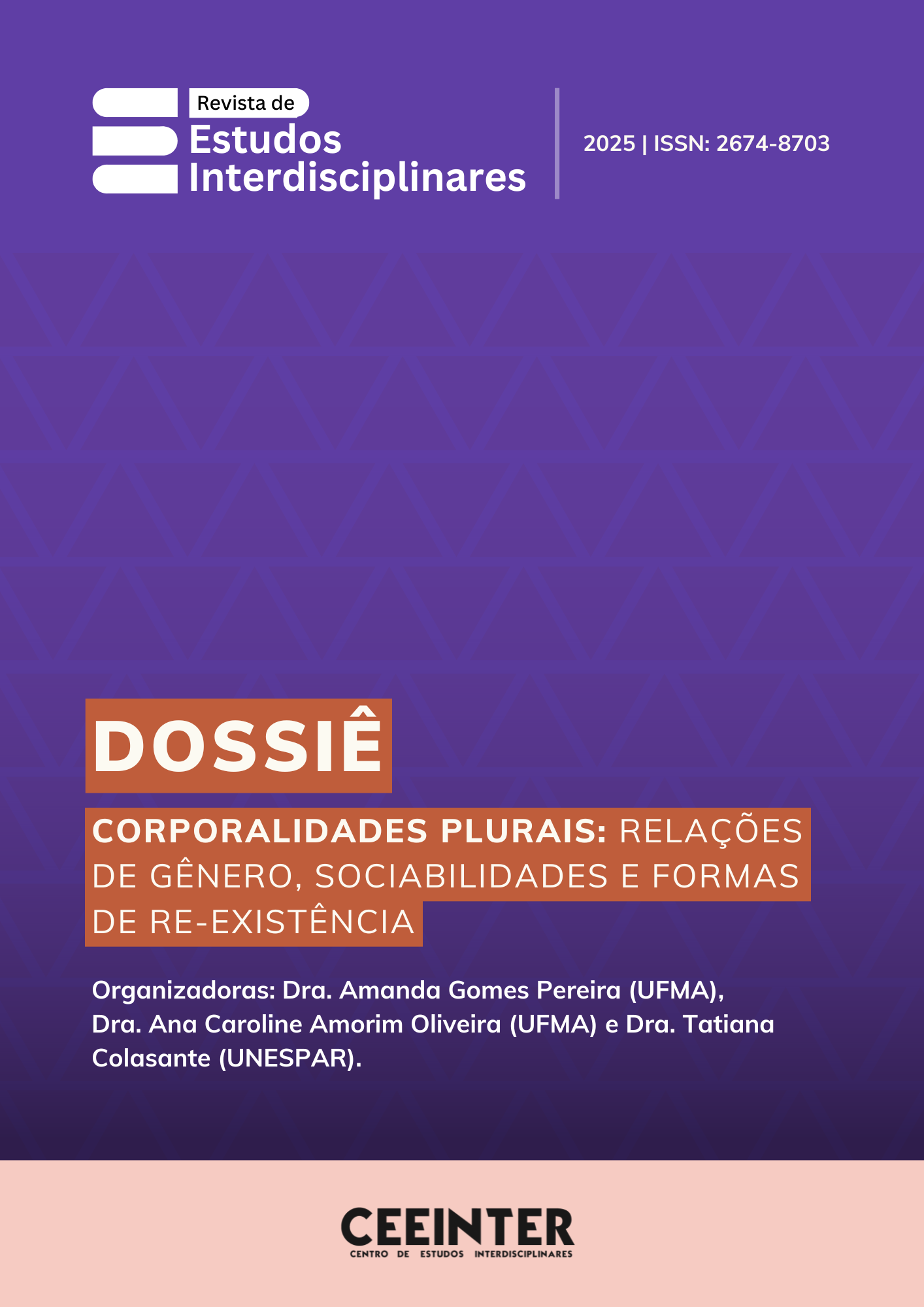REVISITING THE PHILOSOPHICAL FOUNDATIONS OF DECOLONIAL FEMINIST THOUGHT
THE DECOLONIAL FEMINISM OF MARÍA LUGONES
Visualizações: 6DOI:
https://doi.org/10.56579/rei.v7i3.1651Keywords:
María Lugones, Decolonial Feminism, Modern-Colonial Gender System, Coloniality of Gender, Women of ColorAbstract
This is a theoretical-affective text in homage to the life and work of the Argentine María Lugones, a seminal figure in decolonial thought and perspective, who passed away in July 2020. Its aim is to present the philosophical and epistemological foundations of her work through an immersion in her experience as a woman of color, lesbian, wanderer, decolonial feminist philosopher, critical theorist, Chicana university professor in the U.S. academy, popular educator, and singer, as well as an excellent host, according to friends and family.
Her journey through academia and popular education is traced here, with emphasis on her rich philosophical thought, from which concepts such as world-traveling, pilgrimage, modern-colonial gender system, coloniality of gender, and fractured locus, among many others, emerged.
Far from intending to exhaust the author's vast body of work, this study employed a methodology of critical literature review, highlighting two key texts: "Heterosexualism and the Colonial/Modern Gender System" (2008) and "Toward a Decolonial Feminism" (2014).
Through her fused way of thinking, she offers philosophical means to understand the differences between human beings and between humans and their environments, in ways that allow us to grasp from which worldview they perceive the world—whether locally or globally. In other words, beyond Lugones’s contribution to feminist philosophical thought, particularly through her reflections on intersectionality and its deep roots in the coloniality of power, knowledge, and being, lies her unwavering commitment to understanding the lived experiences of women in diverse cultural contexts, under the influence of these forms of coloniality.
With this writing, the intention is not only to systematize María Lugones's main ideas but also to honor her memory—calling on those who resonate with her writing of love to never forget her.
Downloads
References
BALLESTRIN, Luciana. América Latina e giro decolonial. Revista Brasileira de Ciência Política, 2013, n. 11, p. 89-117, 2013. DOI: https://doi.org/10.1590/S0103-33522013000200004
BEAUVOIR, Simone de. O segundo sexo. Rio de Janeiro: Nova Fronteira, 2009.
BIDASECA, Karina. María Lugones. Enciclopédia Mulheres na Filosofia. Campinas, 2020. Disponível em: https://www.blogs.unicamp.br/mulheresnafilosofia/maria-Lugones/. Acesso em: 31 jan. 2024.
CRENSHAW, Kimberlé. Demarginalizing the intersection of race and sex: a black feminist critique of antidiscrimination doctrine, feminist theory and antiracist politics. The University of Chicago Legal Forum, n. 140, p. 139-167, 1989.
DIPIETRO, Pedro et al. La filósofa peregrina: Homenaje a la investigadora y lesbofeminista María Lugones. Nova Iorque, 2020. Disponível em: https://www.pagina12.com.ar/279981-la-filosofa-peregrina. Acesso em: 31 jan. 2024.
GREENBERG, Julie. Definitional Dilemmas: Male or Female? Black or White? The Law’s Failure to Recogniza Interssexuals and Multiracials”. In. LASTER, Toni. (ed.) Gender Nonconformaty, Race, and Sexualty. Charging The Connections. Madison: University of Wisconsin Press, 2002.
GROSFOGUEL, Ramón. A estrutura do conhecimento nas universidades ocidentalizadas: racismo/sexismo epistêmico e os quatro genocídios/epistemicídios do longo século XVI. Sociedade e Estado, Brasília, v. 31, n. 1, p. 25–49, jan./abr. 2016. Disponível em: https://www.scielo.br/j/se/a/wYyDKvsZ7m3jrxRrFnhNzTJ. Acesso em: 4 jun. 2024. DOI: https://doi.org/10.1590/S0102-69922016000100003
HOLLANDA, Heloisa Buarque de (org.). Pensamento feminista hoje: perspectivas decoloniais. Rio de Janeiro: Bazar: 2020.
LANDER, Edgardo (org.). A colonialidade do saber: eurocentrismo e ciências sociais – perspectivas latino-americanas. Buenos Aires: CLACSO, 2005.
LUGONES, María. Pilgrimages/Peregrinajes: Theorizing Coalition against Multiple Oppressions. Lanham: Rowman & Littlefield Publishers, v. 17, n. 2, p. 233–235, 2005. Disponível em: https://archive.org/details/pilgrimagespereg0000lugo/page/n9/mode/2up. Acesso em: 09 fev. 2025. DOI: https://doi.org/10.2979/NWS.2005.17.2.233
LUGONES, María. Playfulness, world-travelling, and loving perception. Hypatia, v. 2, n. 2, p. 3-19, 1987. Disponível em: https://www.jstor.org/stable/3810013. Acesso em: 04 fev. 2024. DOI: https://doi.org/10.1111/j.1527-2001.1987.tb01062.x
LUGONES, María. Motion, stasis, and resistance to interlocked oppressions. In. AIKEN, Susan Hardy et al. (Org.). Making worlds: gender, metaphor, materiality. Tucson: The University of Arizona Press, 1998. p. 49-53. DOI: https://doi.org/10.2307/j.ctv27bds8b.8
LUGONES, María. Heterosexualism and the colonial/modern gender system. Hypatia, v. 22, n. 1, p. 186–209, 2007. DOI: https://doi.org/10.1353/hyp.2006.0067
LUGONES, María. Colonialidad y Género. Tabula Rasa, Bogotá, n. 9, p. 73-101, jun.-dez. 2008. Disponível em: http://www.scielo.org.co/scielo.php?script=sci_arttext&pid=S1794-24892008000200006&lng=en&nrm=iso. Acesso em: 04 fev. 2024. DOI: https://doi.org/10.25058/20112742.340
LUGONES, María. Rumo a um feminismo descolonial. Revista Estudos Feministas, [S. l.], v. 22, n. 3, p. 935–952, 2014. Disponível em: https://periodicos.ufsc.br/index.php/ref/article/view/36755. Acesso em: 05 fev. 2024. DOI: https://doi.org/10.1590/S0104-026X2014000300013
LUGONES, Maria. Colonialidade e gênero. In. HOLLANDA, Heloisa Buarque de (org.). Pensamento feminista hoje: perspectivas decoloniais. Rio de Janeiro: Bazar: 2020.
MIGNOLO, Walter. Histórias Locais/Projetos Globais. Belo Horizonte: UFMG. 2003.
MIGNOLO, Walter D. Delinking. Cultural Studies, [online], v. 21, n. 2, p. 449-514, abr. 2007. Disponível em: http://waltermignolo.com/wp-content/uploads/2013/03/WMignolo_Delinking.pdf. Acesso em: 29 jan. 2024. DOI: https://doi.org/10.1080/09502380601162647
MIGNOLO, Walter. La opción decolonial: desprendimiento y apertura. Um manifiesto y un caso. Tabula Rasa, n. 8, p. 243-282, 2008. DOI: https://doi.org/10.25058/20112742.331
MIGNOLO, Walter. Desobediencia epistémica: retórica de la modernidad, lógica de la colonialidad y gramática de la descolonialidad. Argentina: Ediciones del signo, 2010.
QUIJANO, Aníbal. Colonialidade do poder, eurocentrismo e América Latina. In. LANDER, Edgardo (org.). A colonialidade do saber: eurocentrismo e ciências sociais – perspectivas latino-americanas. Buenos Aires: CLACSO, 2005. p. 117-142. Disponível em: http://biblioteca.clacso.edu.ar/clacso/sur-sur/20100624103322/12_Quijano.pdf. Acesso em: 30 maio 2021.
SEGATO, Rita. El sexo y la norma: frente estatal, patriarcado, desposesión, colonidad. Revita de Estudos Feministas, Florianópolis, v. 22, n. 2, p. 593-616, maio-ago., 2014. Disponível em: https://periodicos.ufsc.br/index.php/ref/article/view/36550. Acesso em: 05 fev. 2024. DOI: https://doi.org/10.1590/S0104-026X2014000200012
SEMANA 11: Colonialidade e gênero – Debate. Com participação de Maria Lugones (Binghamton - USA) e Ângela Figueiredo (UFRB). Youtube, 2020. Transmitido pelo Canal História em Quarentena (92 min.). Disponível em: https://www.youtube.com/watch?v=h54Mlndy0Ws&t=4353s. Acesso em: 05 fev. 2024.

Downloads
Published
How to Cite
Issue
Section
License
Copyright (c) 2025 Interdisciplinary Studies Journal

This work is licensed under a Creative Commons Attribution 4.0 International License.
The Journal of Interdisciplinary Studies adopts the Creative Commons Attribution 4.0 International License (CC BY 4.0), which allows for sharing and adapting the work, including for commercial purposes, provided proper attribution is given and the original publication in this journal is acknowledged.












